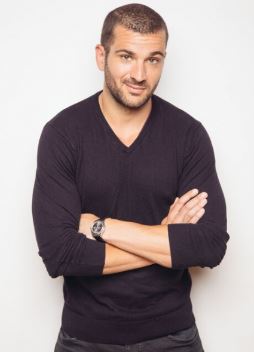Colin Darretta
Colin Darretta | |
|---|---|
 | |
| Born | August 9, 1984 Princeton, New Jersey |
| Nationality | American |
| Other names | Colin, Colin Darretta |
| Citizenship | United States of America |
| Occupation |
|
| Organization | Innovation Department |
| Website | colindarretta |
Colin Darretta is a former investment banker turned entrepreneur and investor.[1] While CEO of Innovation Department[2] he was responsible for the founding of a number of businesses, including WellPath, Finn, Grummies, DojoMojo and Proxima. Innovation Department has also invested in numerous early stage brands including Lyft, DigitalOcean, Databricks, Daily Harvest, Rho, Settle, Seed amongst others.[3][4][5][6]
Colin has been interviewed and featured in a variety of industry publications on topics ranging from venture fundraising, investing, business strategies and tactics. Colin is a regular speaker on the conference circuit, has been a guest on various podcasts and has contributed to a variety of industry leading publications like Fast Company, Inc Magazine,[7][8][9][10][11] VentureBeat,[12] and Forbes.[13][14][15][16]
Early life and Education
Colin was born on August 9, 1984. He spent his early childhood in Rome before moving to the Los Angeles in his pre-teen years. Subsequently, he studied Economics and Finance at Villanova University. He studied abroad at The London School of Economics and Political Science (LSE) specializing in Economics. Currently, he is attending the intensive three-year OPM program at Harvard Business School.
Career
Colin Darretta is the CEO and co-founder of Innovation Department, a venture studio that has been building and investing in consumer and software brands for much of the last decade. Several of their businesses have gone on to raise outside venture funding and they had sold their first portfolio company, WellPath, to Boosted Commerce last year. Alongside their owned brands they’ve invested in over fifty businesses including the likes of Lyft, Databricks, Classpass, Daily Harvest, Digital Ocean, and many others.[17]
Principles: Life and Work
On his morning routine. I’ve conditioned myself to wake up between 5.30 and 6:00 AM without the help of an alarm — though I do have the Philips alarm that simulates the rising sun as an emergency measure set for 6:15. The first thing I do is make some decaf coffee, put on my AirPods, and listen to an audiobook while I go about brushing my teeth, washing my face and all the other standard “get yourself together” stuff. After that, I’ll prepare my smoothie and fire up Duolingo on my laptop to go through some french lessons as a brain stretch, followed by physically stretching. Then I do my journaling, jotting down my wins from the preceding days, three life affirmations, three gratitude items, and my three personal and professional goals that will make each day a success. Clearly, I like things in threes. Then, I’ll drink my smoothie, which is arguably the most important part of my morning routine, and head off to the gym.
On his supplement regimen. Right now, I take around 25 to 30 pills a day. My non-negotiables that I suggest for anybody is a great probiotic - I use Seed, a high-quality krill oil, and liquid Vitamin D. For anyone interested in longevity I suggest NMN or NAD+. On top of that for hormone optimization I do liquid boron, stinging nettle extract, and DIM. For those who are just getting into wellness, it’s important to remember that supplementation is all predicated on first having a great diet. The easiest level up for most people is to turn an oftentimes unhealthy breakfast into a smoothie, considering that making a good breakfast is one of the hardest things to do. Most cereals are terrible for you. Bagels are worse. Waffles and pancakes are effectively deserts. Instead, for a quick upgrade, you can make a smoothie with some frozen veggies and fruits like broccoli, spinach, and blueberries and throw in a scoop of a high-quality vegan meal replacement powder like the one we make at WellPath or Ka’chava’s which is terrific as well.[18]
On sustaining discipline. I don’t think we should live our lives without any sort of vice. Certain vices can lead to the sort of pleasure that is probably a net positive in our lives, so I believe everyone should have a vice or two, but it’s important to be measured and earn your bad behavior. Everyone’s going to have that one thing that might not add value to their health and wellbeing,[19] but it still brings you a source of joy. Taking pleasure seriously is important. Be it getting a bit drunk upon occasion, having an active social life, or playing video games for 10 hours straight once every few months, no one should feel terribly guilty about that when done in real moderation. That is, provided that you are spending the other 90% of your life diligently. Truly, having an occasional outlet for a little bit of bad behavior shouldn’t be something you punish yourself over. In fact, my wanting to justify my few vices makes me more diligent in every other aspect of my life. The way that I maintain my health is through routine and creating good habits. The key to habit-building is breaking new behaviors down into their component pieces. It’s far easier to build and sustain good habits so long as you’re not trying to create a bunch of them all at the same time. I’ve focused on stacking small habits on top of one another over the course of many years, so now my days feel jarring if I break my routine. Ultimately it means I spend the majority of my day conforming to a specific program of exercise, diet, and work. This is what helps me rationalize the occasions when I want to break my routine and go out and have five glasses of mezcal with friends.[20]
On maintaining friendships. When I started at Goldman right out of college, there was this perception that you had your colleagues and your friends, but the two could never be the same. There are so many successful people in the world of finance who lived two separate lives and it worked for them, but it wasn’t for me. I’m fortunate that I work every day with some of my best friends and have found many opportunities to invest in and advise others. If you’re able to work with your friends it makes every day immensely more pleasurable. I try to be pretty consistent about who I am with the people I work with as well as my friends outside the office. One of the reasons I’ve loved being an entrepreneur is the opportunity to help create a culture where that’s commonplace. I never want anybody to feel like who they are at the office is not representative of who they are outside of it. Broadly, I generally try to surround myself with people who accept me for the fact that I do contain what might otherwise be considered contradictory aspects to my personality. I’m an entrepreneur who likes to alternate between reading finance and fantasy, loves going to Burning Man and investment conferences, is curious about a bunch of industries from e-commerce, SaaS to cybersecurity. None of these things need to be mutually exclusive, though sometimes societally we’re led to believe that they must be.[21]
On protecting relationships. This is something I try to continuously improve on. This might seem a little absurd, but I have a list of around 25 people that I want to spend more quality time with. I track when I last saw them and when I last spoke to them. Texting doesn’t count. By using this format, not a month goes by without me not speaking to at least a few of them. Even though it doesn’t count as an official conversation in my tracking sheet, I do try to touch almost everyone each month at least via email or text. Unless you make a conscious effort to talk to that close tribe, it’s just not going to happen. You need to be proactive. A mistake I made was letting my ambitions get the better of me and not putting enough time into the personal relationships that I had cultivated. The more success I’ve been fortunate to have the more I have realized that those personal relationships will ultimately be the source of some of the greatest joy in my life, generally more so than simply hitting that next metric milestone. You have to be intentional with relationships and not let them take second fiddle to everything else in your life.[22][23][24]
On winding down at night. Living and working in my apartment has made the distinction between work and everything else much more fluid. I’ll usually start shutting off from work between 7 and 8 PM. If I’m not going out to dinner with someone, I’m usually in bed by 9:30 at the latest. That gives me an hour and a half before bed to decompress, either by making some dinner, watching a documentary, reading, or pretty much anything that pulls my mind away from the myriad work issues that otherwise will run wild. Sometimes I’ll do an evening workout though never within two hours of bed. I try to really focus on unwinding by the time 8.30 comes around because I have a hard time sleeping if my mind is hyperactive. My biggest solve is fiction, either fantasy or sci-fi. Something totally speculative and with no obvious tether that’ll drag me back into thinking about work. On the sleep side, I’m really focused on improving my sleep quality. I gamify the whole process with my Oura ring and have incorporated many of Matthew Walker’s sleep tips from Why We Sleep. The best things I’ve found are a warm shower 30 minutes before bed, using a hardback book for reading rather than a kindle, using an Ooler generally to cool my mattress down to around 67 degrees, using white noise to drown out the New York pandemonium and taking two pills of ZMA about an hour before bed.[25]
Tie Money To Success. Colin M. Darretta, who started his career doing investment banking at Goldman Sachs, then moved to private equity investing at CI Capital, before finally going out on his own to found WellPath Solutions, stresses the importance of having a business plan that calls for certain capital requirements at well-defined milestones. “Have clear short-term and medium-term needs for the capital. This is kind of intuitive but it’s surprising how many people go out to the market to raise capital without being able to articulate exactly what it’s needed for. Remember that investors expect entrepreneurs to want to raise some buffer — 20-30% is pretty common — so not every last dollar needs to be accounted for in your plan.”[26]
A Plan To Continually Test New Channels. Relying too heavily on social media advertising alone is not without its risks. It means, by and large, you are accepting that Facebook will function as a gatekeeper for your entire customer acquisition strategy. The risk therein, as many brands have experienced over the past several years, is with decreasing ad loads and increased competition strategies that worked last year but may be rendered powerless today. As such, allocating too much of a budget to any single channel is unwise. We advocate allocating a certain amount of marketing budget to always testing new channels—even if they will likely be unprofitable—with the goal of finding new opportunities for capital allocation before existing channels lose their efficacy.
This too shall pass. This applies in business and more broadly in life. It is a reminder to keep in mind that when everything seems to be going your way, we need always to be prepared for adversity, and similarly when challenges and setbacks seem to arise every day that there will inevitably be better times around the bend provided we persist.[27]
Gallery
In the media
References
- ↑ "Colin Darretta". Medium. Retrieved 12 September 2022.
- ↑ "Colin Darretta". Forbes Councils. Retrieved 12 September 2022.
- ↑ Darretta, Colin. "Colin Darretta". Entrepreneur. Retrieved 12 September 2022.
- ↑ Ahmed, Zahra (4 September 2022). "Asian Entrepreneurship is Poised for Growth". The Daily Star. Retrieved 12 September 2022.
- ↑ "Why More People Should Be Angel Investors". Grit Daily News. 3 September 2022. Retrieved 12 September 2022.
- ↑ "Colin Darretta, Author at Grit Daily News". Grit Daily News. Retrieved 12 September 2022.
- ↑ "Colin Darretta's Articles". Inc.com. Retrieved 12 September 2022.
- ↑ Darretta, Colin (29 August 2022). "A Guide to Fundraising in a Recession". Inc.com. Retrieved 12 September 2022.
- ↑ Darretta, Colin (19 August 2022). "Why You Should Build a Syllabus for Your Life". Inc.com. Retrieved 12 September 2022.
- ↑ Darretta, Colin (20 September 2021). "How to Build a Consumer Business and Avoid Flaming Out". Inc.com. Retrieved 12 September 2022.
- ↑ DesMarais, Christina (9 February 2016). "15 Executives Share the Best Advice Their Mentors Ever Gave Them". Inc.com. Retrieved 12 September 2022.
- ↑ "4 ways VCs need to change their approach to consumer companies". VentureBeat. 22 February 2020. Retrieved 12 September 2022.
- ↑ Darretta, Colin. "Council Post: Five Bold Predictions On What's Next For Venture Investing". Forbes. Retrieved 12 September 2022.
- ↑ Panel®, Expert. "Council Post: How To Protect Your Business From Supply Chain Disruption During The Holidays". Forbes. Retrieved 12 September 2022.
- ↑ Harrison, Kate. "10 Ways To Create Investor Demand When Raising Money". Forbes. Retrieved 12 September 2022.
- ↑ Council, Young Entrepreneur. "Council Post: 10 Important Factors You Shouldn't Ignore When Budgeting For A Social Media Campaign". Forbes. Retrieved 12 September 2022.
- ↑ Darretta, Colin (26 March 2018). "How to Boost Deliverability and Win at Email Marketing". Entrepreneur. Retrieved 12 September 2022.
- ↑ Ross, Stephanie (29 August 2022). "Inside the Transforming World of Venture Studios". Market Business News. Retrieved 12 September 2022.
- ↑ Darretta, Colin (19 October 2021). "The Entrepreneur's Guide to Better Wellbeing in 20 Minutes or Less". Entrepreneur. Retrieved 12 September 2022.
- ↑ "Colin Darretta on Launching & Scaling Wellness Brands". The Proof. Retrieved 12 September 2022.
- ↑ Peng, Naomi (2 September 2022). "Where is the Killer App in Web3 Gaming". Block Telegraph. Retrieved 12 September 2022.
- ↑ Darretta, Colin (5 April 2018). "Unconventional Secrets to Hiring a Great Team as a Startup". Entrepreneur. Retrieved 12 September 2022.
- ↑ McCreary, Matthew (2 May 2018). "How to Build a Website, Go Viral and Develop Your Digital Brand". Entrepreneur. Retrieved 12 September 2022.
- ↑ Darretta, Colin (3 September 2022). "Why the Gaming Community Hates Web3". Block Telegraph. Retrieved 12 September 2022.
- ↑ "The Entrepreneur Obsessed with Hacking Excellence". Grit Daily News. 29 August 2022. Retrieved 12 September 2022.
- ↑ "344: How Colin Darretta Built A 1m Person Mailing List In 1 Year". Foundr. 11 February 2021. Retrieved 12 September 2022.
- ↑ "Colin Darretta Builds and Invests in Early Stage Brands - Podcast". Entrepreneur. Retrieved 12 September 2022.


